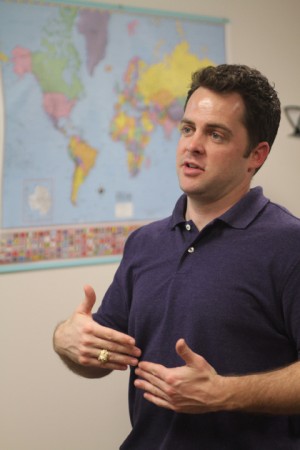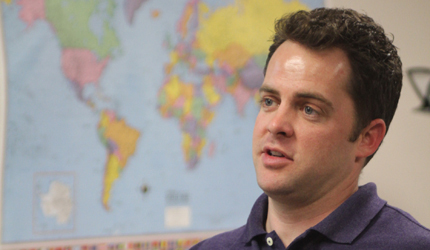
Jed Dean | Lariat Photo Editor
Peace Corps applicants span variety of majors
By Caitlin Giddens
Reporter
The Peace Corps finds its most precious resource in the American people and in their skills for improving the world — this is the asset the Corps seeks to tap across the country and at Baylor.
“I have found in recruiting at Baylor that students have a lot of volunteer work and mind for international affairs,” Dallas regional recruiter Curt Baker said. “This, combined with their willingness to help others, makes Baylor students good candidates for the Peace Corps.”
The Peace Corps recruits volunteers with its motto, “Life is calling. How far will you go?”
Participants travel to more than 70 countries, enlisting 4,000 new volunteers each year. The different areas these volunteers can work with include health and HIV treatment, business and communication technology, environment, education and community and youth development.
“We always need people who can teach English,” Baker said. “And that’s not because we barge into the countries that we’re helping and demand they learn English. We’re just meeting the request of the host countries who ask for more English education.”
Applicants interested in teaching English are required to have earned 30 hours of English or foreign language tutoring.
Those interested in entering the health section of the Peace Corps are required to accumulate 30 hours of volunteering at a hospital or shadowing a doctor.
Each year more than 12,000 applications are received to fill about 4,000 positions.
“It’s very selective, but if you can target your application to a specific category, then you will be more competitive,” Baker said. “And if you aren’t a senior yet, you can work to add to your application so you can be qualified by your senior year.”
The application process is typically nine to 12 months, including interviewing and multicultural training.
While Peace Corps attempts to place each chosen volunteer in the country he or she prefers, Baker said the best participants are flexible and willing to accept any challenge. Overland Park, Kan. senior Callie Finkle is considering the Peace Corps challenge.
“I’m interested in global health and women’s health, which is something the Peace Corps caters to,” Finkle said.
“And I think opening myself to other cultures is really important in this time of my life.” During her family and consumer science class’ trip to Belize, Fort Worth junior Lauren Goff gained interest in the Peace Corps.
She knew the cultural education she received in Belize needed to be continued, Goff said.
“In Belize, we got to meet volunteers with the Peace Corps and I got interested in how I could become involved,” Goff said.
“Now I’m looking at how Peace Corps can work for me and my major.”
Peace Corps recruiters stress not only the diversity of volunteers and their interests, but also the image they present.
“Some of the places our volunteers go to have never worked with Americans,” Baker said.
“So it’s important their behavior and image represents America. Peace Corps volunteers are like unofficial ambassadors for America.”






